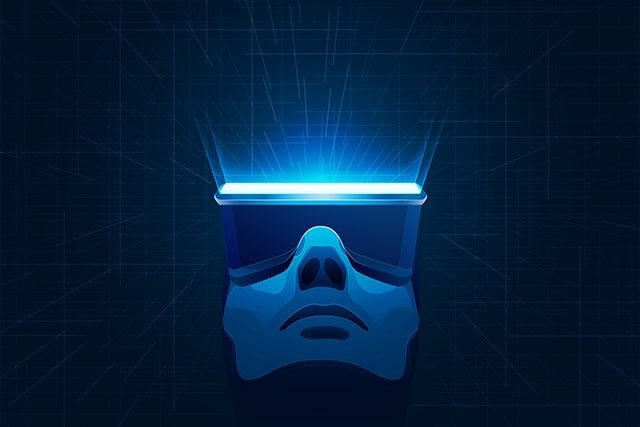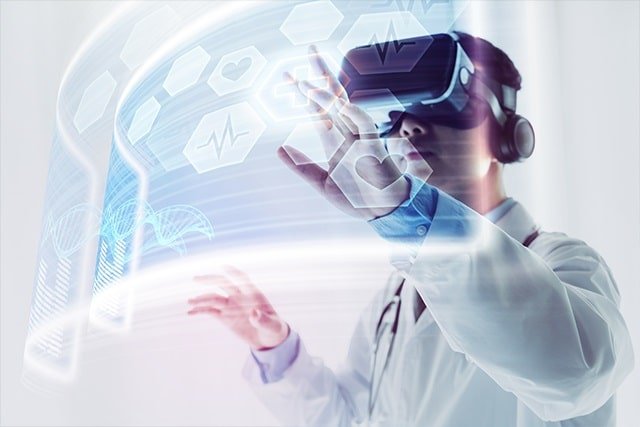Augmented Reality & Virtual Reality
What is Virtual Reality?
Virtual Reality (VR) is an artificial environment created through software and presented to users in a way that makes them perceive it as a real environment. SuperTek specializes in handling various Virtual Reality projects, ranging from basic VR environment setups to large-scale VR projects that may involve combining machine learning with VR technology. If you’re looking to enhance your marketing strategies through VR experiences, reach out to SuperTek for a discussion on how they can assist you in achieving your goals.

Virtual Reality (VR) has indeed emerged as a revolutionary means of conducting simulations, providing users with a virtual world through VR headsets. This technology primarily alters the participant’s vision and hearing to recreate a real-life environment. Virtual reality programs are typically developed using Virtual Reality Modeling Language (VRML). VR technology finds applications in enhancing video and computer games, entertainment, as well as creating virtual simulations for training in real-life activities, such as flying airplanes. SuperTek leverages VR technology to create immersive experiences across various domains.
Absolutely, Virtual Reality (VR) is a groundbreaking technology that allows users to experience immersive environments that feel real, even though they exist in the digital realm. The ability of VR to trick the brain into perceiving a different reality has immense potential, and major tech companies are investing significant resources in its development. Google, Facebook, and other industry leaders recognize VR as the next big thing, and its applications span various fields, from entertainment and gaming to education, healthcare, and beyond. SuperTek is at the forefront of leveraging VR to create captivating and realistic experiences for users.
Applications
SuperTek offers virtual reality-based services and solutions for various applications such as
- Maintenance training
- Operational training
- Product manual
- Gaming
- Product visualization
- Concept visualization
- Interactive walkthrough
- Interactive learning content




Benefits of Virtual Reality
Innovation: VR is used for therapy to address stress and anxiety-related disorders. Virtual environments can be created to provide a controlled and immersive experience for therapeutic purposes.
Better Quality Delivery: VR is effectively utilized for creating 3D designs and walkthroughs by architects. This allows for a more immersive and realistic visualization of architectural plans, contributing to better project understanding and planning.
Transformation: VR facilitates interactive and fun learning for students through audio-visual learning tools. Virtual environments can simulate historical events, scientific processes, and more, making learning engaging and memorable.
Cost Reduction: VR eliminates the need for travel in various corporate scenarios. It is used for virtual meetings, training sessions, and workshops, providing a cost-effective and efficient alternative. VR-based training also allows employees to experience real-life situations in a simulated environment.
New Services: Users can enjoy live streaming of events, tournaments, and concerts comfortably at home through VR. Virtual reality enhances the viewing experience by providing an immersive and interactive way to engage with media content.
What is Augmented Reality?
“Augmented reality is the integration of digital information with the user’s environment in real-time.”
Augmented Reality is an upcoming and fast-growing technology. Augmented reality differs from virtual reality in the sense that it doesn’t replace the actual world with a virtual world but adds to the real world by overlaying digital content over the real world. It can be experienced through AR glasses, mobile applications or head-mounted devices. By empowering your mobile application with Augmented Reality (AR) it is possible to effectively reach out to millions of users. The trend of mobile apps & devices augmenting the reality in our vicinity is on the rise and your business can be a forerunner of the trend to brighten your business prospects. AR is becoming extremely popular as it can be used to blend digital elements into the real world. For instance, it is implied to display score overlays on telecasted games, pop out emails and messages, holograms, etc.

Types of Augmented Reality
SuperTek can undertake any Augmented Reality project regardless of the size of it. Let us know what you have in mind and we will sit with you to assess and give further recommendations to help you make it a reality.
- Marker-based Augmented Reality
- Marker-less Augmented Reality
- Projection-Based Augmented Reality
- Superimposition Based Augmented Reality
Applications
SuperTek offers augmented reality-based services and solutions for applications such as
- Maintenance training
- Product manual
- Gaming
- Architectural designing
- Product trial
- AR Shopping
- AR Museum
- AR Bookcontent




Benefits of Augmented Reality
- AR offers the potential to revolutionize storytelling in movies and gaming by providing a unique and immersive experience for audiences. High-quality, engaging content can be enhanced with interactive elements, creating a more captivating entertainment experience.
- The retail industry can leverage AR to boost revenues by creating AR stores and markets. For instance, customers can virtually try on clothes without physically wearing them, enhancing the online shopping experience and reducing the likelihood of returns.
- AR simulators can be instrumental in reducing the cost of training across various sectors. For example, pilots can use AR simulations for flight training, and doctors can benefit from AR-assisted surgeries, providing a realistic training environment.
- AR can enhance the travel and tourism industry by offering new and immersive experiences to visitors. Museums, historical sites, and tourist destinations can use AR to provide interactive and informative content, making the experience more engaging and educational.
- In manufacturing, AR can play a crucial role in reducing waste. For example, automobile designers can use AR to visualize virtual parts on a real car body, allowing them to assess the final product’s look and make informed decisions before physical production, thus minimizing waste.
How Does use of AR and VR Benefits your Businesses?
The following are the top five benefits of augmented reality technology and virtual reality technology:
Improved Information
A primary advantage of augmented reality (AR) apps lies in their ability to offer businesses a platform for providing users with supplementary information about the services they offer. By furnishing detailed insights into product features, spatial aspects, and material composition, potential customers are inclined to engage in transactions with the company. Additionally, through virtual reality apps, customers can seamlessly access pertinent information about a product’s attributes and applications, all in real-time.
Effortless Visualization
Companies specializing in AR app development and VR app development play a pivotal role in assisting businesses to generate a visual representation of their products. This enables consumers to evaluate the product within a personalized context, where they can customize features like size or color to align with their specific needs. For example, in the fashion industry, boutiques and design stores have the flexibility to adjust the color, texture, and design of garments to harmonize with the preferences of their customers.
Enhanced User Experiences
Integrating augmented reality and virtual reality into your business provides a remarkable user experience. Customers can make informed purchasing decisions regardless of their time zone or location. The seamless integration of these technologies empowers independent users to evaluate products autonomously, ensuring effective virtual interaction between consumers and sellers.
Boosts Brand Awareness
Businesses armed with virtual reality and augmented reality technologies are always in demand among customers and potential users. Numerous AR and VR companies have the capability to devise unparalleled marketing strategies using these technologies to enhance visibility for their business. Moreover, companies embracing innovative technologies consistently remain favorites among clients, as they perceive the service provider to be up-to-date with changing trends.
Tackle
Competition
Augmented reality apps and virtual reality apps are an indisputable method to reach a more technophile community and sway them from the competition towards their product. With the assistance of the top augmented virtual reality companies, businesses can introduce their services to the customers and embed the brand in the memory of the users. The use of AR headsets to enable potential buyers to visualize the final construction of a house during its construction phase is one of the most definitive augmented reality examples.
Industries We Serve On AR/VR?
The following are the most prominent industries that are being revolutionized using Augmented reality and Virtual reality
Education
Indeed, the influence of top AR companies is already transforming the education sector on multiple fronts. Augmented reality proves valuable in helping students grasp abstract concepts by converting objects into three-dimensional models, fostering improved focus and motivation for learning.
Simultaneously, virtual reality companies are crafting VR platforms tailored for classrooms, enabling students to embark on guided tours of globally renowned cities and explore otherwise inaccessible realms such as the deep ocean and outer space. Additionally, through technologies developed by virtual reality applications companies, educational institutions can enhance staff training to deliver superior education to students. VR technology provides apprentices with advanced visuals, facilitating more efficient absorption of lessons.
Healthcare
Certainly, top Augmented Reality companies play a crucial role in developing AR solutions that facilitate medical practitioners in offering remote consultations and treatment to patients. AR app companies empower doctors to map essential movements recommended for physical therapy.
On the other hand, Virtual Reality development companies are instrumental in creating VR apps that assist patients dealing with chronic pain. For example, a Virtual Reality app called ‘Snow World’ is utilized to distract severe burn victims from pain by immersing them in a calming virtual environment. VR technology can also aid individuals in overcoming phobias, such as the fear of heights, crowds, insects, and more.
Real Estate
Integrating AR/VR technology can provide a significant boost to the real estate industry. Leading Augmented Reality software enables real estate owners to seamlessly blend physical and virtual experiences, offering interactive walkthroughs of the site and delivering essential project information instantly.
Virtual Reality, on the other hand, enables potential buyers to virtually tour the property and make purchase decisions based on a more immersive experience than static images. Additionally, with the support of Virtual Reality applications companies, architects can develop VR apps that showcase their plans and designs to clients, reducing the chances of miscommunication during the project’s conception.
Tourism
AR/VR technology has showcased immense potential for the tourism industry. Virtual reality technology enables individuals to virtually visit a location, while augmented reality app companies have created AR solutions that allow users to merge the location with their current surroundings. This technology aids potential travelers in deciding which attractions to visit and which hotels to stay in.
Furthermore, augmented reality can enhance the Global Positioning System (GPS) by providing accurate route analysis, traffic information, and diversions. Augmented virtual reality companies have also developed apps that automatically translate signs, facilitating travel in foreign countries even with limited knowledge of the local language. A notable example of augmented reality is Yelp, which uses its Monocle option to display nearby cafes and restaurants.
Marketing
Hiring AR companies to create an AR marketing solution can assist businesses in crafting a personalized experience for their consumers, ultimately enhancing user engagement metrics and boosting brand recognition. AR apps enable consumers to virtually try products before making a purchase.
In the realm of VR marketing, businesses can bring their products directly to consumers’ doorsteps. Additionally, virtual reality instills a sense of excitement in the minds of potential customers.
